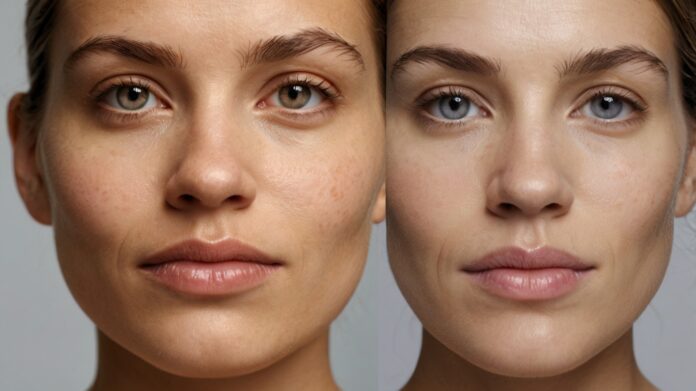Retinol Before and After Transforming Your Skin has taken the skincare world by storm, with transformative “before and after” stories that seem almost too good to be true. But what exactly is retinol, and how does it work on your skin? In this guide, we’ll explore everything you need to know about using retinol for remarkable results. From what to expect in the first few weeks to how retinol affects different skin types, this article covers it all.
What is Retinol?
Origins and Benefits of Retinol
Retinol, a derivative of vitamin A, is a well-studied ingredient known for its anti-aging, skin-smoothing, and brightening effects. Found in serums, creams, and oils, it’s a go-to solution for tackling wrinkles, acne, and uneven skin tone.
Why Retinol is a Game-Changer for Your Skin
Scientifically Backed Benefits of Retinol
Retinol’s popularity isn’t just hype. It’s one of the few ingredients with proven results for increasing skin cell turnover, which helps diminish fine lines, reduce acne, and fade dark spots.
How Retinol Impacts Skin Texture and Tone
As retinol accelerates cell turnover, it creates smoother, more even skin. Imagine it as a reset button for your skin, enhancing radiance and softness over time.
How Retinol Works on the Skin
Cellular Level Changes in the Skin
Retinol penetrates the skin, stimulating collagen production while encouraging new skin cells to emerge. These cellular changes improve skin texture and firmness.
Why Retinol Takes Time to Show Results
Patience is key. Retinol needs time to work, with results generally visible after consistent use for around 8-12 weeks. This gradual process ensures lasting changes rather than quick fixes.
Retinol Before and After: What to Expect
The First Few Weeks
When starting retinol, the first few weeks can bring slight dryness, redness, or peeling as your skin adapts. This is normal, so don’t panic.
Visible Results Over Time
Between 8-12 weeks, you’ll notice smoother, clearer skin with less pronounced wrinkles or blemishes. Retinol provides long-term improvements that many other products can’t match.
Long-Term Benefits of Retinol
In the long run, retinol becomes a potent tool for maintaining youthful, healthy skin by continuously enhancing elasticity and glow.
Common Skin Issues Addressed by Retinol
Fine Lines and Wrinkles
Retinol has a reputation for smoothing fine lines and softening wrinkles, thanks to its collagen-boosting abilities.
Hyperpigmentation and Dark Spots
If you struggle with dark spots or uneven tone, retinol can fade pigmentation, leading to a brighter, more even complexion.
Acne and Breakouts
Retinol’s cell renewal benefits make it a powerful anti-acne treatment, reducing clogged pores and inflammation.
Choosing the Right Retinol Product
Types of Retinol Available in the Market
Retinol products vary from over-the-counter creams to prescription-strength formulas. Choose one based on your skin’s needs and tolerance.
Concentrations and Formulations
Start with a low concentration (0.25% or 0.5%) if you’re new to retinol. Higher concentrations work well for seasoned users but can irritate beginners.
How to Start Using Retinol Safely
Building a Routine for Beginners
Begin with a pea-sized amount, applying it at night a few times a week. Gradually increase usage as your skin adjusts.
Adjusting to Retinol to Avoid Irritation
Moisturize well and use sunscreen daily to protect your skin, as retinol makes it more sensitive to UV rays.
Retinol Before and After for Different Skin Types
Dry and Sensitive Skin
Retinol can be intense on dry or sensitive skin. Use a lower dose and follow with a rich moisturizer to prevent dryness.
Oily and Acne-Prone Skin
Oily or acne-prone skin typically tolerates retinol well. It helps control excess oil production, reducing breakouts over time.
Retinol Myths and Misconceptions
Common Myths Debunked
Some believe that retinol thins the skin, but in reality, it strengthens it. Another myth is that retinol only works at night—it’s best used at night but not useless during the day if used with SPF.
How to Maximize Your Retinol Results
Complementary Skincare Ingredients
Pair retinol with ingredients like hyaluronic acid and peptides to boost hydration and skin resilience.
Sun Protection and Retinol
Retinol increases sensitivity to sunlight, making daily SPF essential to prevent sun damage and maintain results.
Real-Life Retinol Before and After Stories
Experiences from Retinol Users
Countless individuals have shared their retinol “Retinol Before and After” experiences, showcasing remarkable transformations in skin smoothness, clarity, and youthfulness.
Potential Side Effects and How to Manage Them
Common Side Effects of Retinol
Initial redness, peeling, or dryness may occur. These side effects usually decrease with consistent use and proper hydration.
Tips for Minimizing Irritation
Apply retinol on dry skin and wait a few minutes after cleansing to reduce irritation. You can also buffer it with moisturizer.
Conclusion: Is Retinol Right for You?
Retinol Before and After Transforming Your Skin might just be the skincare hero you’ve been looking for. It offers impressive “before and after” results for those willing to commit to a consistent routine. While the journey can require patience, the results—smoother, clearer, and more youthful skin—make it worth the effort. Whether you’re tackling signs of aging, pigmentation, or acne, retinol can be a game-changer in your skincare arsenal.
Frequently Asked Questions About Retinol Before and After
How long does it take to see results from retinol?
It generally takes 8-12 weeks of consistent use to see noticeable improvements.
Can I use retinol every night?
Beginners should start slowly, using it 2-3 times a week and building up to nightly use.
What should I avoid when using retinol?
Avoid using other strong actives, like AHAs or BHAs, on the same night as retinol to prevent irritation.
Does retinol make skin more sensitive to the sun?
Yes, always wear sunscreen during the day to protect your skin.
Who should avoid using retinol?
Pregnant or breastfeeding individuals should consult a doctor before using retinol.



